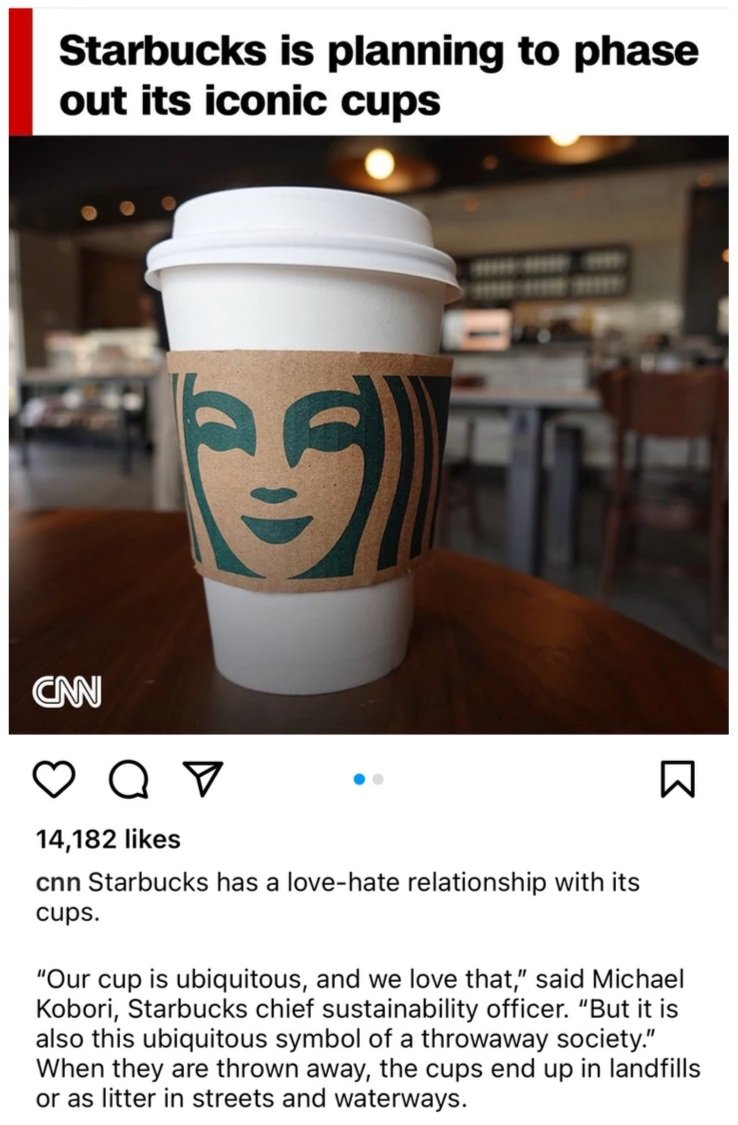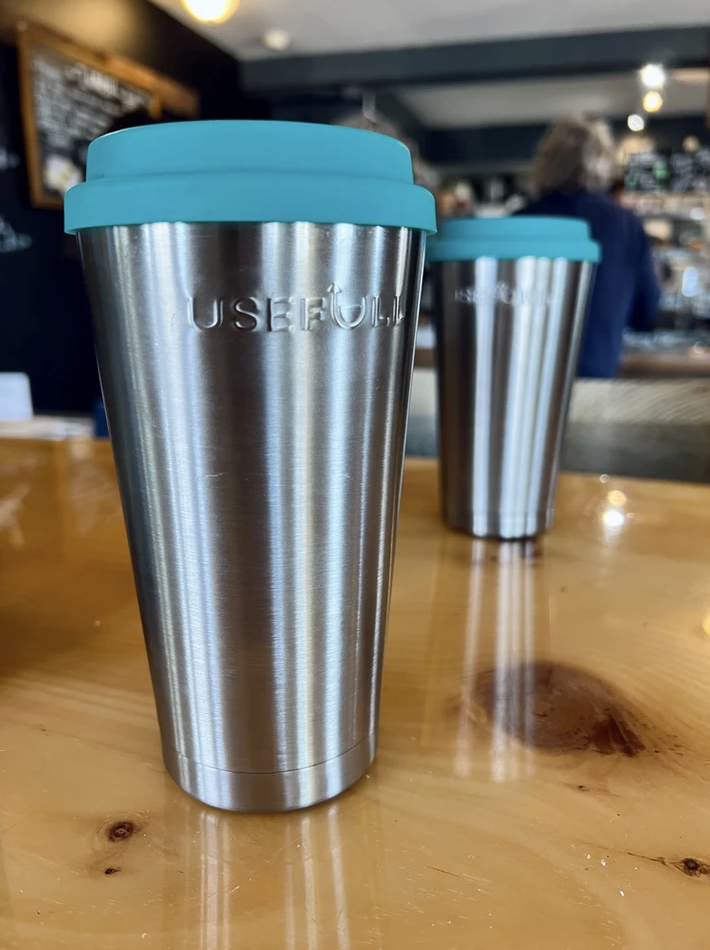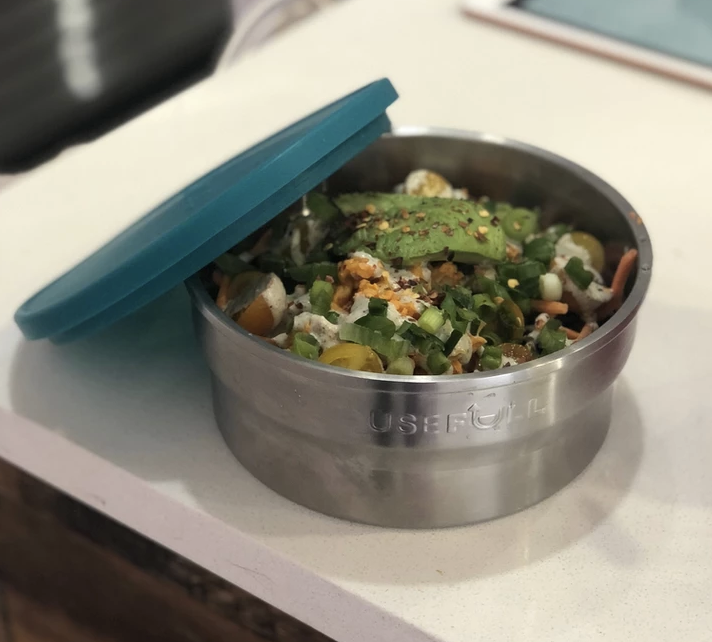The good and the bad of Starbucks’ plan to move toward plastic reusable cups
I, like you, read the CNN article featuring Starbucks’ breaking news this morning. One of my friends texted me, “Starbucks stole your idea!”. And while I’d like to think this is true - as I made my pitch with this very concept in 2013 - I can’t get too mad.
The reuse movement has started to really blossom. While some reuse companies might see this as competition, I really see this as a great opportunity for the circular economy.
Remember when Starbucks was first becoming popular? The mom and pop coffee shops did not want Starbucks in their neighborhood. Why? Fear of competition. But, much to their surprise, it turned out that having a Starbucks on the block helped to drive revenue to their own storefronts. In other words, Starbucks normalized the 3rd place and helped to promote demand for high-end coffees. And here we are again, 20ish years later, with Starbucks leading the charge in the reusable to-go space.
Changing consumer behavior is hard and expensive, which is why my team has focused on NOT being in the business of changing behavior. Instead we enable the behavior change with our technology and inventory while partnering with organizations that are in the position to change behavior.
There are three reasons why I think the Starbucks effort to implement returnable cups may come up against some roadblocks.
Coopetition will drive success
Plastic is little more than greenwashing
Deposit systems don’t work.
Coopetition
Implementing a reusable cups strategy can only be successful with “coopetition” -collaboration between business competitors - for mutually beneficial results. Starbucks, Dunkin', Panera, Tatte, Blue Bottle, Flour, Cafe Nero, etc. will have limited success if they attempt to roll out siloed programs. Return locations need to be as ubiquitous as community trash bins are today, something that a single coffee chain cannot provide across neighborhoods at large. USEFULL provides that collaborative opportunity, assuring ease of adoption across all participants and consumers.
Plastic = Greenwashing
We appreciate the intention of Starbucks and other reuse programs using reusable plastic cups/containers, but this is little more than greenwashing. Even when delivering these reusable plastics to a plastics recycler, the plastic recycling rates are atrocious. Maybe it's "wish-cycling"
Solving a plastic problem with thicker, more durable plastic is not the solution. Plastic will never be green. Ignoring the recycling factor, plastic production is environmentally harmful and often impacts human health (e.g. GhG emissions, and carcinogens). Beyond environmental impact, plastic is detrimental to human health, especially when we put hot food/drinks inside. There is no biodegrading and plastics/micro-plastics will be with us forever. Plastic "reusables" are better than single use, but far from where we need to be.
“Stainless steel is the preferred choice... It can be used many more times than reusable plastic and is better for the environment and people all around.”
Life Cycle Assessment (LCA) commissioned by UPSTREAM Solutions. Assumes that manufacturing takes place in China (pg. 6)
Deposit systems don’t work for the consumer.
Charging customers to do the right thing has never worked. Consumers have come to expect cups to be free and why should that change? Asking consumers to put down a deposit via the Starbucks app bodes very well for Starbucks. They get to hold onto your money for as long as you have the cup. This doesn’t incentivize timely returns, which is a key component of circular economies. Timely returns ensures that cups come back with minimal science experiments (cleaner) and requires less inventory to be available in the system.
Case in point, I live in Massachusetts and each time I buy beer, I pay a $0.05 deposit on that beer can. I can count on one hand the number of times I’ve bothered to take those cans back to the liquor store for my refund: zero. I do however put the cans in my curbside recycling. It’s a money maker, but not necessarily incentivizing the intended behavior. A $1 deposit isn’t enough to always get the desired behavior.
“While some of the components of the Starbucks plan would no doubt benefit from retooling, the overarching concept and the fact that the company is pilot testing so many different variables should be lauded. The most important takeaway here is that the world’s largest coffee company – and one of the world’s most recognized brands – is taking the consequences of our disposable culture seriously enough to do something about it. Brands the world over should and will take note. At USEFULL, we stand ready to step in and help turn the tide.”
About USEFULL
USEFULL is a tech-enabled circular economy solution designed to eliminate single-use food/beverage products. USEFULL enables organizations and communities to meet their zero waste goals. We provide our proprietary technology and patent pending inventory of vacuum insulated stainless steel to-go cups and containers to our partners. Via the USEFULL app, users can checkout and return our products anywhere within the network.
Organizations have made failed attempts to adopt zero waste solutions due to poor quality reusable containers (plastic) and lack of technology-based inventory control. USEFULL provides proprietary technology (app and backend) as well as patent pending stainless steel inventory (vacuum insulated cups and containers). Organizations save money, meet their sustainability goals, and market their zero waste initiatives to their constituents. Consumers rent the cups/bowls for free so long as they return within their rental window, like a library book.
We are not focused on changing consumer behavior. We partner with organizations committed to zero waste and provide them with the tools and expertise needed to meet their goals.
By Alison Rogers, Founder & CEO




